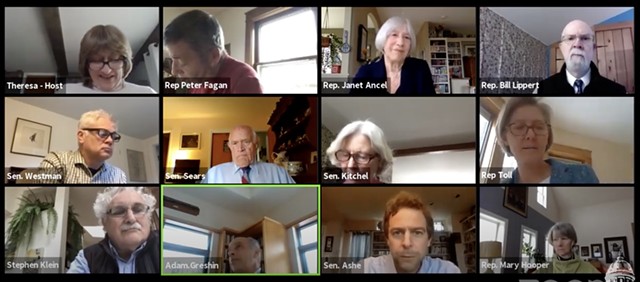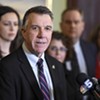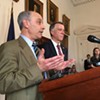Switch to the mobile version of this page.
Vermont's Independent Voice
- News
- Arts+Culture
- Home+Design
- Food
- Cannabis
- Music
- On Screen
- Events
- Jobs
- Obituaries
- Classifieds
- Personals
Browse News
Departments
Browse Arts + Culture
View All
local resources
Browse Food + Drink
View All
Browse Cannabis
View All
-
Culture

'Cannasations' Podcaster Kris Brown Aims to 'Humanize'…
-
True 802

A Burlington Cannabis Shop Plans to Host…
-
Business

Judge Tosses Burlington Cannabiz Owner's Lawsuit
-
Health + Fitness

Vermont's Cannabis Nurse Hotline Answers Health Questions…
-
Business

Waterbury Couple Buy Rare Vermont Cannabis License
Browse Music
View All
Browse On Screen
Browse Events
Browse Classifieds
Browse Personals
-

If you're looking for "I Spys," dating or LTRs, this is your scene.
View Profiles
Special Reports
Pubs+More
Monday, April 27, 2020
Statehouse Scott Administration, Legislature Clash Over Coronavirus Spending
Posted By Paul Heintz on Mon, Apr 27, 2020 at 6:27 PM
click to enlarge 
Since the novel coronavirus arrived in Vermont last month, Gov. Phil Scott and legislative leaders have generally avoided public disagreement. But during a meeting of the legislature's Joint Fiscal Committee on Monday, that spirit of collaboration began to fray.

- Screenshot
- Commissioner Adam Greshin addressing members of the Joint Fiscal Committee over Zoom on Monday
At issue was how to spend the $1.25 billion Vermont has received in federal coronavirus relief funding — and who has the authority to spend it.
Lawmakers also expressed alarm at how much money the administration has already doled out in response to the public health crisis. Finance Commissioner Adam Greshin told the committee that he had signed checks worth $86 million — and that state agencies expected to spend more than $165 million on immediate needs within weeks.
"I'm quite surprised at the $80 million figure you rolled out, because last I knew we were talking about $23 million that had been paid," Sen. Jane Kitchel (D-Caledonia), who chairs the Senate Appropriations Committee, told Greshin.
"The purpose of all this is to try to create a partnership, and at least so far that's not — we don't really have the information that we could use [to] become partners in this endeavor," said Rep. Janet Ancel (D-Calais), who chairs the House Ways and Means Committee.
Since the state received $1.25 billion early last week from the federal Coronavirus Relief Fund, the Joint Fiscal Committee has been debating how it should be appropriated. The committee includes chairs of the legislature's four taxing and spending panels, along with several other leading lawmakers.
Late last week, the committee proposed to the administration that the executive branch could spend up to $60 million of the money on "health and safety and other emergency response needs" without legislative approval. That amount could be increased by a vote of the committee.
The proposal would also allow the executive branch to spend another $150 million on "time-sensitive critical needs" with Joint Fiscal's sign-off. The committee would vote on such requests within a week — or sooner, if necessary.
The remaining $1.04 billion would have to be allocated through the traditional appropriations process, with full votes of the House and Senate and the signature of the governor.
During Monday's meeting, Greshin told lawmakers that those parameters "give us pause." He added, "I'm just worried that $60 million — I would argue that's already spent or damn close to it."
Greshin noted that the administration and legislature were working together on a supplemental spending bill — known as a budget adjustment act — for the remaining two months of the current fiscal year, but he expressed concern that it could take time for that to become law.
"If you could promise me that the budget adjustment would be passed in a week or two, perhaps the governor might think differently, but we all know that the legislative process takes a little while, and I'm just worried about restricting his ability to navigate," Greshin said.
"Well, commissioner, the reason you're here is to actually work with us to come up with something that you think works," Senate President Pro Tempore Tim Ashe (D/P-Chittenden) snapped. "This is the first we're hearing that you think the numbers should be different. So if you want to propose something that you think would work and give you flexibility without handing over $1.25 billion to the administration to unilaterally decide how to spend, we're all ears."
Greshin suggested that Joint Fiscal allow the executive branch to spend the $60 million and the $150 million without legislative approval. "We're just trying to have flexibility for a rapid response," he said. "We do not anticipate these expenditures will be on initiatives that the legislature will not agree with. This is not supposed to be contentious."
But legislators appeared cool to the idea. "Part of the problem is, I get a call from one of my constituents who might have heard this, saying, 'What did they do with the [money]?' And, frankly, I don't have a clue," said Sen. Dick Sears (D-Bennington), a member of the Senate Appropriations Committee. "And this puts us in a really difficult position to try to partner with you or with the administration in this effort."
Greshin explained that $27 million of the $86 million already spent had gone to Vermonters seeking unemployment benefits — money he expected the federal government to replace. That included $10 million worth of $1,200 checks the administration mailed last week to those whose claims had yet to be processed. "People saw the governor, among others, carrying boxes of checks," Greshin told Sears. "So $10 million went right out the door right away — and there's a deserving case we need to do that again."
Legislators used the occasion to complain about the administration's stewardship of the unemployment insurance program, which has been hobbled by aging technology and a shortage of Department of Labor staff.
"For three weeks, legislators heard nothing but horror stories from people who could not get a human being to take their unemployment calls, questions, errors, whatever," Ashe said. "And instead of turning around and criticizing the administration, we tried to express how overwhelmed the Labor Department had been and that we were encouraging patience at a time when people were freaked out in a major way."
Ashe claimed that legislators had urged the administration to mail the $1,200 checks and increase its staffing but that the department had dragged its heels.
"It highlights why there needs to be a Joint Fiscal role in some of the decisions moving forward — especially in those that are not life or death, because the administrative branch does not have sole custody of knowledge about the best way to meet people's needs during this time," Ashe said. "And while you had the best information on unemployment, we had the best intuition about unemployment, and our intuition was not met by action."
The committee ultimately voted unanimously in favor of its own proposal, but it held out the possibility of increasing the amount of money the administration could spend without approval at a later date. Greshin, in turn, pledged to provide a full accounting of the money already spent by the beginning of next week.
During a press conference later Monday morning, Scott himself echoed Greshin's call for "some flexibility" to spend money as the administration saw fit, but he downplayed the differences between the two branches. He said that governors of other states had cut out their legislatures entirely and alluded to a court battle in New Hampshire over the appropriations process, but he said he had "relinquished" his own authority in the interest of collaboration.
"We want to work together, and we're in this crisis together, and we'll work our way out of it together, and that means having some dialogue about how we spend the money," Scott said. "I welcome their involvement."
Disclosure: Tim Ashe is the domestic partner of Seven Days publisher and coeditor Paula Routly. Find our conflict-of-interest policy here: sevendaysvt.com/disclosure.
Tags: coronavirus, COVID-19, Joint Fiscal Committee, Adam Greshin, Jane Kitchel, Janet Ancel, Tim Ashe, Dick Sears, Web Only, Image
Comments
Comments are closed.
Since 2014, Seven Days has allowed readers to comment on all stories posted on our website. While we’ve appreciated the suggestions and insights, the time has come to shut them down — at least temporarily.
While we champion free speech, facts are a matter of life and death during the coronavirus pandemic, and right now Seven Days is prioritizing the production of responsible journalism over moderating online debates between readers.
To criticize, correct or praise our reporting, please send us a letter to the editor. Or send us a tip. We’ll check it out and report the results.
Online comments may return when we have better tech tools for managing them. Thanks for reading.
Related Stories
About The Author

Paul Heintz
Bio:
Paul Heintz was part of the Seven Days news team from 2012 to 2020. He served as political editor and wrote the "Fair Game" political column before becoming a staff writer.
Paul Heintz was part of the Seven Days news team from 2012 to 2020. He served as political editor and wrote the "Fair Game" political column before becoming a staff writer.















































